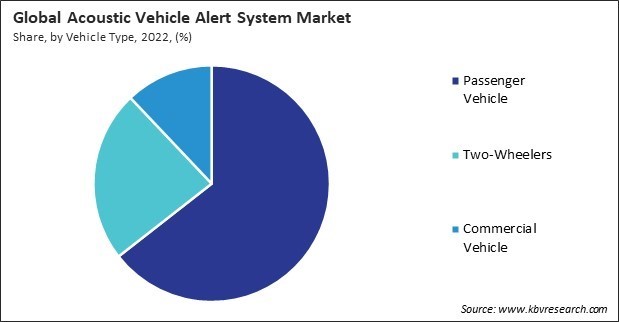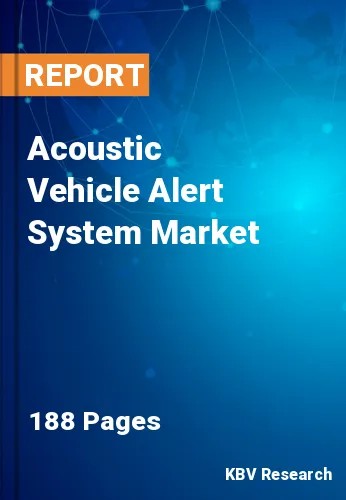“Global Acoustic Vehicle Alert System Market to reach a market value of USD 1.5 Billion by 2030 growing at a CAGR of 12.1%”
The Global Acoustic Vehicle Alert System Market size is expected to reach $1.5 billion by 2030, rising at a market growth of 12.1% CAGR during the forecast period.
The Asia Pacific region, particularly countries like China and India, has witnessed a steady increase in automobile sales. Therefore, the region captured $221.50 million revenue in the market in 2022. The growth of the automotive sector in these countries has been driven by urbanization, a rising middle class, and increased disposable income. Many countries in the Asia Pacific region have been proactive in implementing regulations aimed at enhancing road safety. Some jurisdictions have mandated the use of AVAS in electric and hybrid vehicles to protect pedestrians.

Regulatory bodies worldwide have a growing consensus regarding the need to address pedestrian safety concerns associated with quiet electric vehicles. The incorporation of audible warning systems ensures that the quiet nature of electric vehicles does not compromise pedestrian safety, especially in urban environments. Hence, these factors will boost the demand for AVAS in the coming years.
Additionally, the global trend of escalating urbanization has led to a significant rise in traffic congestion, presenting challenges for road safety in crowded urban environments. Many urban areas feature intricate road networks, including multi-lane roads, roundabouts, and pedestrian crossings. AVAS mitigate risks in these complex infrastructures by providing timely alerts to all road users about the movement of nearby vehicles. Thus, these factors will lead to increased demand in the market.
However, the automotive landscape boasts many vehicle models with unique architecture and electronic systems. The challenge lies in tailoring acoustic alert systems to seamlessly integrate with this diversity, requiring a nuanced understanding of the intricacies of various vehicle architectures. Ensuring that auditory alerts synchronize effectively with visual displays and other sensory feedback mechanisms demands careful consideration and testing. Hence, owing to these aspects, there can be a downturn in the market.
On the basis of vehicle type, the market is divided into passenger vehicle, two-wheelers, and commercial vehicle. The passenger vehicle segment dominated the market by 64.43% revenue share in 2022. An increasing recognition among consumers regarding AVAS's protective advantages could motivate automakers to incorporate these systems into a wider variety of passenger vehicles, including those still powered by conventional internal combustion engines.

Based on propulsion type, the market is segmented into battery electric vehicle (BEV) and plug-in hybrid electric vehicle (PHEV). In 2022, the plug-in hybrid electric vehicle (PHEV) segment garnered 33.18% revenue share in the market. Many countries and regions have introduced or are planning to introduce regulations mandating the inclusion of AVAS in electric and hybrid vehicles. Compliance with these regulations will likely drive AVAS system installation in PHEVs. Therefore, owing to these factors, there will be enhanced growth in the segment.
Free Valuable Insights: Global Acoustic Vehicle Alert System Market size to reach USD 1.5 Billion by 2030
By region, the market is segmented into North America, Europe, Asia Pacific, and LAMEA. In 2022, the Europe segment acquired 28.9% revenue share in the market. Europe has seen a steady increase in electric vehicle (EV) adoption. Stricter safety regulations and standards in the automotive industry, particularly related to pedestrian safety, drive the adoption of safety features such as acoustic vehicle alert systems. Hence, the segment will grow rapidly in the coming years.
| Report Attribute | Details |
|---|---|
| Market size value in 2022 | USD 560.5 Million |
| Market size forecast in 2030 | USD 1.5 Billion |
| Base Year | 2022 |
| Historical Period | 2019 to 2021 |
| Forecast Period | 2023 to 2030 |
| Revenue Growth Rate | CAGR of 12.1% from 2023 to 2030 |
| Number of Pages | 188 |
| Number of Tables | 250 |
| Report coverage | Market Trends, Revenue Estimation and Forecast, Segmentation Analysis, Regional and Country Breakdown, Porter’s 5 Forces Analysis, Company Profiling, Companies Strategic Developments, SWOT Analysis, Winning Imperatives |
| Segments covered | Propulsion Type, Vehicle Type, Region |
| Country scope |
|
| Companies Included | Continental AG, STMicroelectronics N.V., HELLA GmbH & Co. KGaA, Mercedes-Benz Group AG, Brigade Electronics Group PLC, Harman International Industries, Inc. (Samsung Electronics Co., Ltd.), Honda Motor Co. Ltd., Kendrion N.V., Soundracer AB, Maruti Suzuki India Limited |
By Propulsion Type
By Vehicle Type
By Geography
This Market size is expected to reach $1.5 billion by 2030.
Global emphasis on electric vehicles and sustainable mobility are driving the Market in coming years, however, Integration complexity with existing vehicle systems restraints the growth of the Market.
Continental AG, STMicroelectronics N.V., HELLA GmbH & Co. KGaA, Mercedes-Benz Group AG, Brigade Electronics Group PLC, Harman International Industries, Inc. (Samsung Electronics Co., Ltd.), Honda Motor Co. Ltd., Kendrion N.V., Soundracer AB, Maruti Suzuki India Limited
The expected CAGR of this Market is 12.1% from 2023 to 2030.
The Battery Electric Vehicle (BEV) segment is leading the Market by Propulsion Type in 2022; there by, achieving a market value of $951.2 Million by 2030.
The Asia Pacific region dominated the Market by Region in 2022, and would continue to be a dominant market till 2030; there by, achieving a market value of $591.3 Million by 2030.
Our team of dedicated experts can provide you with attractive expansion opportunities for your business.

 Drivers
Drivers
 Restraints
Restraints
 Opportunities
Opportunities
 Challenges
Challenges
